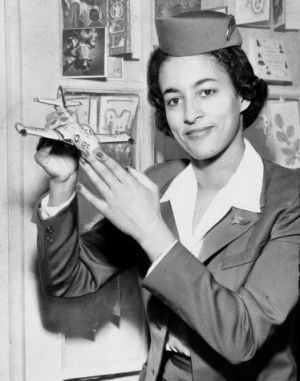Black History
Ruth Carol Taylor: Breaking the Sky-High Ceiling
During a 1997 interview with Jet magazine, Taylor described herself as a “blacktivist,” and admitted that she had “no long-term career aspirations as a flight attendant but only wanted to break the color barrier.”

It was the 1950s. The United States had been dubbed “the world’s strongest military power.” The economy was booming. Jobs were overflowing; housing was plentiful. But for Black Americans, racism was on fire, the Civil Rights Movement was gaining speed, and the best-paying jobs were for whites.
The airlines were no exception.
None of this stopped Ruth Carol Taylor (1931–), a journalist and nurse from New York City, from submitting her application to Trans World Airlines (TWA) for the position of airline stewardess (known today as flight attendants).
Her application was rejected almost immediately because she “did not meet the airline’s physical standards.”
Stewardesses, at the time, were selected because of their physical attractiveness and height/weight conformity. But the decision made to reject Taylor’s application was racially motivated. She filed a discrimination complaint with the New York State Commission and approached other airlines offering the position.
Mohawk Airlines, a regional passenger airline operating in the Mid-Atlantic region of the U.S., mainly in New York and Pennsylvania, began advertising open positions for stewardesses. The company also announced the open recruitment of Black women. More than 800 applied, and Taylor became one of the new hires. This made her the first African-American airline flight attendant in the US. It was 1958.
When asked about being the only Black hire, Taylor said that she believes it was “due to nearly white-passing skin and features.” She completed her training in early 1959 and was ready to take on her first flight.
After a few months, TWA, threatened by the lawsuit, brought its first Black stewardess onboard: Margaret Grant.
A short time later though, Taylor was grounded. She was let go from Mohawk on another discriminatory practice: she met and married Rex Legall and was forced to resign from her position. A ban against stewardesses being married or pregnant was not uncommon at that time.
Due to the decisive court case of Diaz vs. Pan Am., the no-marriage rule was eliminated throughout the US airline industry by the 1980s.
Taylor and Legall traveled and lived abroad for a few years. After their divorce, Taylor, in 1977, returned to New York City and nursing.
Best known for breaking the color barrier in the airline industry, Taylor was also an activist for minority and women’s rights. In 1963, she covered the March on Washington as a journalist for a British magazine, Flamingo.
By 1977, she began to focus more on her work as an activist. In 1982, she cofounded the Institute for Inter-Racial Harmony Inc. There she developed testing designed to measure racial bias in educational, commercial, and social settings.
During a 1997 interview with Jet magazine, Taylor described herself as a “blacktivist,” and admitted that she had “no long-term career aspirations as a flight attendant but only wanted to break the color barrier.”
Today she lives in Brooklyn.
Activism
Oakland Post: Week of December 25 – 31, 2024
The printed Weekly Edition of the Oakland Post: Week of December 25 – 31, 2024

To enlarge your view of this issue, use the slider, magnifying glass icon or full page icon in the lower right corner of the browser window. ![]()
Activism
Living His Legacy: The Late Oscar Wright’s “Village” Vows to Inherit Activist’s Commitment to Education
Kingmakers of Oakland (KOO), a nonprofit organization that works to improve educational and life outcomes for Black boys and men, stated that “Oscar Wright is one of the most prolific, consistent, and committed advocates of equity for Black students and Black Families here in Oakland for the past six decades.”

By Antonio Ray Harvey, California Black Media
Activists mourning Oscar Carl Wright’s death, have pledged to continue his lifelong mission of advocating for Black students and families in Northern California.
Wright, 101, who passed away on Nov. 18, was involved in Oakland’s educational affairs until his death.
Now, friends and admirers acknowledge that carrying on his legacy means doubling down on the unfinished work that Wright dedicated his life, time, and resources to, according to Y’Anad Burrell, a family friend and founder of San Francisco-based Glass House Communications (GHC).
“Mr. Wright did a lot of work around equity, specifically, for Black students based on their needs — whether it was tutoring, passing classes, or graduating,” Burrell said.
Wright became a champion for his children’s education, recognizing the disparities between their school experiences and his own upbringing in the Mississippi Delta.
Burrell told California Black Media (CBM) that the crisis of unequal access to resources and a quality education continues to affect the Oakland Unified School District (OUSD).
According to Oakland Reach, in the city of Oakland, only 3 in 10 Black and Brown students are reading at or above grade level. In addition, only 1 in 10 are doing math at or above grade level.
Oakland REACH is a parent-run, parent-led organization. It aims to empowers families from the most underserved communities to demand high-quality schools for their children.
Wright’s work as an activist had impact across the state but he was primarily known in the Bay Area. Alongside the Black United Front for Educational Reform (BUFER), he filed a complaint against OUSD for violating the Civil Rights Act of 1964.
In 2000, the OUSD school board proposed an action plan to address educational inequity, but it was never implemented.
Wright later founded the African American Honor Roll Celebration at Acts Full Gospel Church, an award that recognizes Black students with a grade point average of 3.0 or better. Each year, more than 1,000 students are honored at this ceremony.
Kingmakers of Oakland (KOO), a nonprofit organization that works to improve educational and life outcomes for Black boys and men, stated that “Oscar Wright is one of the most prolific, consistent, and committed advocates of equity for Black students and Black Families here in Oakland for the past six decades.”
Burrell said that one of the main reasons Wright’s work was so essential for families and children in Oakland that is the direct relationship between acquiring a quality education and affording quality housing, maintaining food security, achieving mental wellness, and securing stable employment.
Wright was the child of sharecroppers from Coahoma County, Mississippi. He attended Alcorn State University, a Historically Black College and University (HBCU).
In the late 1950s, Wright and his family relocated to the Bay Area where he worked as a contractor and civil engineer. He later became an active member of the National Association for the Advancement of Colored People (NAACP).
Burrell said the people who will carry on Wright’s work are part of a “village” that includes KOO’s CEO Chris Chatmon. Wright was a mentor to Chatmon.
“It will not be one entity, one person, or one organization that picks up the baton because it was a village effort that worked alongside Mr. Wright for all these years,” Burrell said.
Burell says that legacy will live on.
Activism
Celebrating East Bay Leaders Keith Carson and Federal Glover at Geoffrey’s Inner Circle
Several leaders were in attendance including fellow Alameda Supervisors Elisa Marquez and Lena Tam, Superior Court judge-elect Terry Wiley, and African American Sports and Entertainment Group’s founder Ray Bobbitt, along with many other guests.

By Magaly Muñoz
After decades of public service in the East Bay, community members and leaders came together to celebrate Alameda County Supervisor Keith Carson and Contra Costa Supervisor Federal Glover at Geoffrey’s Inner Circle Thursday afternoon.
Several leaders were in attendance including fellow Alameda Supervisors Elisa Marquez and Lena Tam, Superior Court judge-elect Terry Wiley, and African American Sports and Entertainment Group’s founder Ray Bobbitt, along with many other guests.
First elected in 1992, Carson has served District 5 for 24 years and announced his decision to step away from his seat earlier this year, just before the deadline to submit new candidate applications.
He dedicated his long career to bringing access to health care, addressing homelessness, lowering crime, improving business retention, and growing job opportunities in Alameda County.
Glover began his tenure as Contra Costa Supervisor in 2000 and previously served as mayor of Pittsburg in 1998. During his time as Supervisor, he supported initiatives on public transportation, created committees for public safety, and supported task forces on health.
“These two distinguished leaders have dedicated their lives to improving the lives of so many people across Alameda and Contra Costa (counties). Their work has touched every corner of the East Bay,” Alameda County Supervisor and President Nate Miley said.
Leaders from both counties spoke on the supervisors’ legacies and their dedicated years of service.
Contra Costa Supervisor John Gioia said that Glover was the type of person that grew with each challenge that crossed him, especially after he had major surgery in 2020. But Gioia said that the treatment did not deter Glover.
“He’s had tougher races for reelection than any member of our board that I can recall, and he’s always come back stronger than before,” Gioia said.
Sharing a county border, Gioia complimented Carson on his ability to sway leaders from both sides of the political aisle to listen on the issues affecting locals and residents across the nation.
Shannell Scales Preston, who is taking over Glover’s D5 seat in 2025, told event attendees that Glover was a mentor to her for many years. He often would call Preston after Pittsburg City Council meetings with remarks about her performance and how well she spoke up on certain issues.
With Glover spending years as the only Black elected official in local government, Preston would ask him how he managed to not feel lonely about the job. She then congratulated him on being the only supervisor in Contra Costa to have all Black mayors under his district in 2023.
Preston said he’s been a leader to many diverse groups and his tenure has seen leaders of all backgrounds, but particularly paving the way for Black leaders in predominantly white areas.
Miley, who has shared his entire 24-year tenure on the Alameda Board with Carson, tearfully wished the exiting supervisor luck and said he would miss him dearly.
Carson said that as we embark on a “dark time” for everyone across the nation and worldwide in 2025, it’s important to continue communicating and working with groups from all backgrounds because that is the only way things will get done.
“There have been many lonely nights, but then the sun comes out in the morning when you continue to think, ‘I can make a difference,’” Carson said.
-

 Activism4 weeks ago
Activism4 weeks agoOakland Post: Week of November 27 – December 3, 2024
-

 Activism2 weeks ago
Activism2 weeks agoButler, Lee Celebrate Passage of Bill to Honor Congresswoman Shirley Chisholm with Congressional Gold Medal
-

 Activism2 weeks ago
Activism2 weeks agoPost News Group to Host Second Town Hall on Racism, Hate Crimes
-

 Activism2 weeks ago
Activism2 weeks agoDelta Sigma Theta Alumnae Chapters Host World AIDS Day Event
-

 Business2 weeks ago
Business2 weeks agoLandlords Are Using AI to Raise Rents — And California Cities Are Leading the Pushback
-

 Activism3 weeks ago
Activism3 weeks agoOakland Post: Week of December 4 – 10, 2024
-

 #NNPA BlackPress4 weeks ago
#NNPA BlackPress4 weeks agoNational Action Network Announces 2025 Inauguration Day Rally
-

 Activism2 weeks ago
Activism2 weeks agoOakland Post: Week of December 11 – 17, 2024




























































